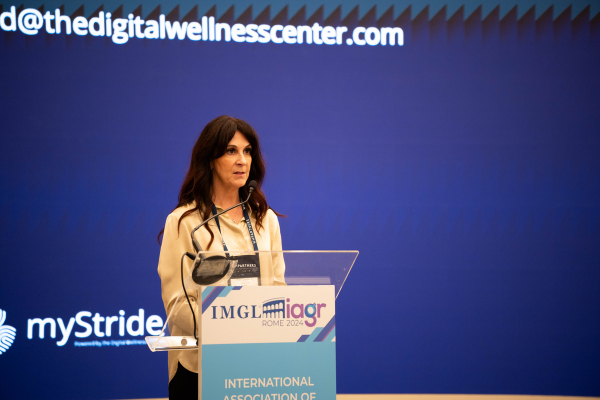
From my brother’s bad bet to smarter play
Why responsible gaming needs innovation, not restriction
Guest article provided by Dr Mary Donohue, CEO & Founder, The Digital Wellness Center
Mary is pictured above speaking at IAGR2024 in Rome
Most innovations start as accidents. Mine was no different.
I didn’t set out to change responsible gaming. I set out to help my brother.
He loved betting—still does. For him, gambling was entertainment, the way some people love going to the movies. But as I watched him play, I saw a pattern: when he was on a losing streak, he didn’t stop to think. He doubled down. And he wasn’t alone. The cycle of chasing losses is universal. It’s how the brain works under stress—it locks into survival mode, making snap decisions instead of thoughtful ones.
I didn’t want to stop my brother from gambling. That wasn’t the point. I just wanted him to pause and think before he made his next move. The problem was, if I told him to slow down, he’d ignore me. What brother listens to his sister?
So, I tried something different.
Instead of telling him what to do, I distracted him—got him to engage in something fun for a few minutes before he placed his next bet. And something incredible happened. When he went back to his game, he wasn’t chasing losses. He was thinking more clearly, playing for fun, making better choices. That small pause—the microbreak—was enough to reset his decision-making.
That accidental insight became the foundation for myStridePositivePlay, a neuroscience-backed approach to responsible gaming that actually works.
Why traditional responsible gaming falls short
For years, regulators and operators have used restrictions to promote responsible gaming—banning ads, raising age limits, and imposing session caps. And while these efforts have helped, they don’t address the reality of today’s players.
Now we’re dealing with Generation Z, a generation that lives in and on their phones.
Science tells us that simply knowing about a risk—what’s called raising awareness—doesn’t lead to action, especially with Gen Z, as I discuss in my book Message Received.
Public health campaigns, from smoking cessation to drunk driving, don’t just warn people; they provide behavioral nudges that make better decisions easier.
Imagine if society had responded to drunk driving by banning cars instead of inventing seatbelts.
- In the 1980s, “Don’t Drink and Drive” campaigns changed behavior, not just laws.
- In the 2000s, airbags and crumple zones made driving safer without stopping people from driving.
- In responsible gaming, we don’t have the equivalent of seatbelts or airbags—just bans and restrictions.
That’s what The Digital Wellness Center has created—seatbelts for gambling.
A smarter alternative: Player-centric interventions
A recent third-party applied qualitative research study on digital well-being, using data from our trials, examined how brief digital interventions influence mood shifts, providing insights into emotional engagement and improving responsible gaming strategies.
The results were clear.
- Forty percent of stressed users and 55 percent of annoyed users improved their mood after engaging with our interventions.
- Overall, 25 percent of non-happy users experienced a positive shift in mood.
Players who were already in a positive emotional state remained stable, preventing mood drops that could lead to impulsive decisions. - Current pilot programs with affiliates and casinos are trending even higher, showing that modifying mood can modify behavior.
By helping players self-regulate their emotions in real time, we’re giving them the tools to make better choices—reducing impulsivity, improving decision-making, and enhancing responsible gaming outcomes.
We help people help themselves.
Why interventions work better than restrictions
At The Digital Wellness Center, we’ve pioneered a new model for responsible gaming that’s rooted in neuroscience, behavioral psychology, and trust-building.
It’s a digital solution for a digital generation.
Here’s why it works.
- Interventions work better than interruptions. Traditional responsible gaming tools rely on generic pop-ups or rigid session limits—things players often ignore. Instead, our patent-pending cadence scale integrates seamlessly into gameplay, allowing players to self-regulate their mood in real time.
- Microbreaks stabilize emotions. Players experiencing stress or frustration are far more likely to make impulsive decisions. Our research shows that a well-placed intervention can dramatically improve emotional stability within minutes.
- Mood-driven engagement increases trust. Players who engage with our neuroscience-backed tools report higher trust in the platform, leading to better retention and more responsible play.
What’s in it for regulators and operators?
Regulators and gaming operators face the same challenge: how to protect players without driving them away. Everyone in the regulated industry wants players to be safe and to have fun. Traditional responsible gaming efforts often feel like punishment—pushing players toward unregulated markets instead of keeping them safe.
Regulators also want future-proofing against generational shifts. Younger players, Millennials and Gen Z, expect technology to be part of their gaming experience. They don’t want warnings; they want smart tools that help them manage their play.
A system built around engagement rather than restriction offers a smarter solution.
Regulatory compliance with better outcomes. Proactive tools allow regulators to shift from punitive approaches to evidence-based interventions that actually change behavior.
Better business results. Engagement-based responsible gaming strategies keep players in a positive emotional state, leading to better retention and stronger brand trust.
What regulators and operators can do differently
Governments and industry leaders often default to prohibition-style regulations, despite clear evidence that empowerment-based interventions are far more effective. Instead of focusing on what players shouldn’t do, we should be giving them the tools to make better decisions themselves.
By integrating neuroscience-backed interventions, operators and affiliates can:
- Build stronger trust with their customers, improving long-term retention.
- Reduce impulsive gambling behaviors without alienating players.
- Foster a gaming environment that prioritizes well-being while maintaining engagement.
A call to action
The future of responsible gaming isn’t restriction—it’s innovation.
Research proves that small, targeted interventions—backed by neuroscience and behavioral insights—can redefine responsible gaming. Regulators and operators who adopt these methods can enhance compliance, improve customer satisfaction, and strengthen brand loyalty.
Like my brother, no one—not me, not regulators, not operators—will stop people from gambling.
But we can help them play smarter.
If you’re a regulator or industry leader looking for a research-driven, scalable approach to responsible gaming, we’d love to collaborate. Let’s build solutions that actually work.





